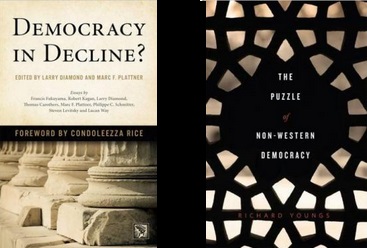Democracy in Decline?; The Puzzle of Non-Western Democracy
14 مايو 2016

Edited by Larry Diamond and Marc F. Plattner, Richard Youngs
Reviewed by G. John Ikenberry
Liberal democracy is in trouble. The great wave of democratization that spread across the developing world at the end of the Cold War has long since crested. Today, it is the undertow of dashed expectations that seems to define the fate of modern democracy: political gridlock, economic stagnation, increasing inequality, fraying social contracts, reactionary nationalism, and rising authoritarianism. In their illuminating collection, Diamond and Plattner have assembled leading experts who offer mostly grim assessments of the situation. Diamond, in his own contribution, sifts through the data and reports that the democratic world is in “recession,” sharing the stunning observation that during the past three decades, fully 24 percent of the world’s democracies have broken down. Some have been the victim of military coups, but more often, democracies have experienced a slow degradation of political rights and legal procedures through electoral fraud and the rise of authoritarian leaders. Robert Kagan emphasizes the importance of geopolitical leadership as a stabilizer and promoter of democracy. But such leadership is difficult to provide when the main leader—the United States—is itself so troubled. Francis Fukuyama points to the failure of new democracies to build functioning modern states, which is an essential precondition for high-quality governance. The only good news that the contributors offer is that authoritarian states remain unstable and incapable of mastering the long-term challenges of modernizing societies and economies.
What if the problem is that Western-style democracy simply does not fit the circumstances of non-Western societies? In The Puzzle of Non-Western Democracy, Youngs explores the rich but muddled debate on African, Asian, Latin American, and Middle Eastern approaches to democracy. In his fascinating accounts of ideas, thinkers, and political movements in those regions, Youngs reveals a great diversity of alternative democratic forms. Some edge toward illiberalism, upholding political competition but abridging individual rights. Others resemble social democracy, in which rights are defined in terms of group solidarity and social justice. Still others are little more than cloaks for authoritarian agendas. If democracy has a future, Youngs concludes, it will feature a great variety of participatory mechanisms and forms of community. But, he persuasively argues, any successful variation on the democratic theme will need to maintain a deep commitment to individual rights and limited government.
———————–
Source: Foreign Affairs Magazine
 عن أمل جنبلاط المتجدد: لبنان يستحق النضال
عن أمل جنبلاط المتجدد: لبنان يستحق النضال
 صحافيون أم عرّافون!
صحافيون أم عرّافون!
 ماذا يجري داخل أروقة بيت الكتائب المركزي؟
ماذا يجري داخل أروقة بيت الكتائب المركزي؟


 عن الخرائط التي تُرسم والإتفاقات التي تتساقط!
عن الخرائط التي تُرسم والإتفاقات التي تتساقط!
 “الإنحراف في الحياة”/ بقلم كمال جنبلاط
“الإنحراف في الحياة”/ بقلم كمال جنبلاط
 هاشتاغ #صار_الوقت يحل أولاً في حلقة جنبلاط
هاشتاغ #صار_الوقت يحل أولاً في حلقة جنبلاط
 طاولة نقاش عن أزمة الصحافة في جامعة AUST
طاولة نقاش عن أزمة الصحافة في جامعة AUST
 عبدالله: ليظهر لنا وزير مكافحة الفساد حرصه في صفقات البواخر والفيول
عبدالله: ليظهر لنا وزير مكافحة الفساد حرصه في صفقات البواخر والفيول
 عبدالله: غريب أمر وزارة مكافحة الفساد!
عبدالله: غريب أمر وزارة مكافحة الفساد!

 Comment to Uri Avnery: How Sad What Is Looming Ahead
Comment to Uri Avnery: How Sad What Is Looming Ahead
 “Not Enough!”
“Not Enough!”
 … لمن لم يقرأ يوسف البعيني/ بقلم وسام شيّا
… لمن لم يقرأ يوسف البعيني/ بقلم وسام شيّا
 كمال جنبلاط في مولده الأول بعد المائة: تعاليمه وأفكاره ما زالت الحلّ/بقلم عزيز المتني
كمال جنبلاط في مولده الأول بعد المائة: تعاليمه وأفكاره ما زالت الحلّ/بقلم عزيز المتني
 رئيس حزب/ وليس (… سابقاً)/ بقلم د. خليل احمد خليل
رئيس حزب/ وليس (… سابقاً)/ بقلم د. خليل احمد خليل
 التوازن السياسي في لبنان
التوازن السياسي في لبنان
 لبنان… مشاريع انقلابية مؤجلة
لبنان… مشاريع انقلابية مؤجلة
 جنبلاط وحَمَلة أختام الكاوتشوك
جنبلاط وحَمَلة أختام الكاوتشوك
 Le Liban est un symbole de tolérance
Le Liban est un symbole de tolérance
 Our Automated Future
Our Automated Future
 The True Origins of ISIS
The True Origins of ISIS
 Les Misérables vs. Macron
Les Misérables vs. Macron
 عذراً أيها المعلم/ بقلم مهج شعبان
عذراً أيها المعلم/ بقلم مهج شعبان
 رساله الى المعلم / بقلم ابو عاصم
رساله الى المعلم / بقلم ابو عاصم
 إلى روح القائد والمعلم كمال جنبلاط/ بقلم أنور الدبيسي
إلى روح القائد والمعلم كمال جنبلاط/ بقلم أنور الدبيسي
 أسرار وعناوين الصحف ليوم الجمعة 14 كانون الاول 2018
أسرار وعناوين الصحف ليوم الجمعة 14 كانون الاول 2018














